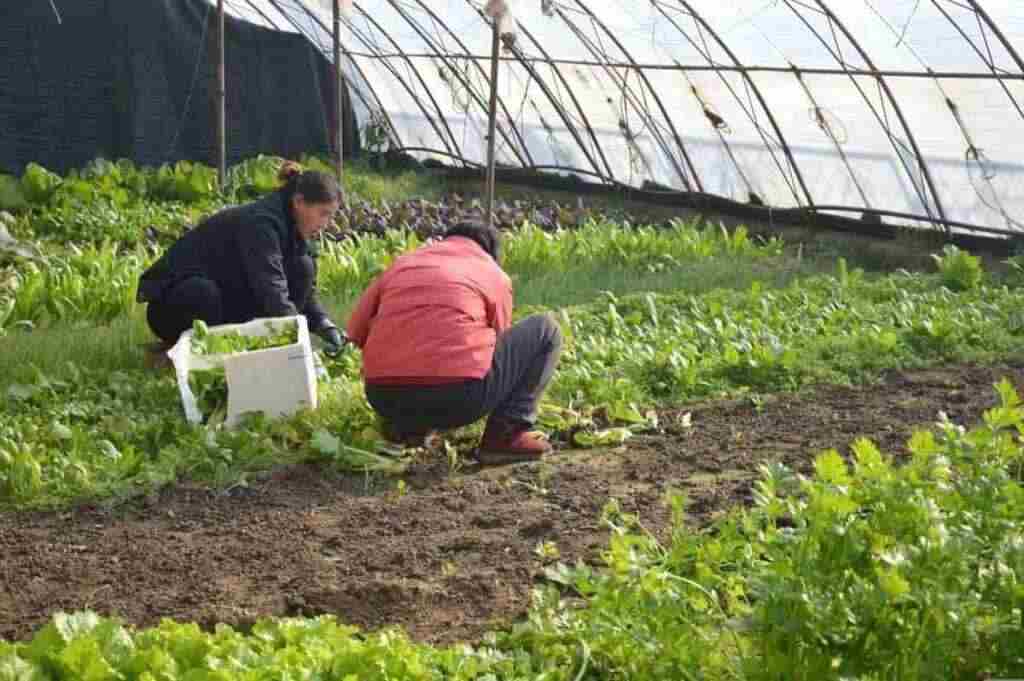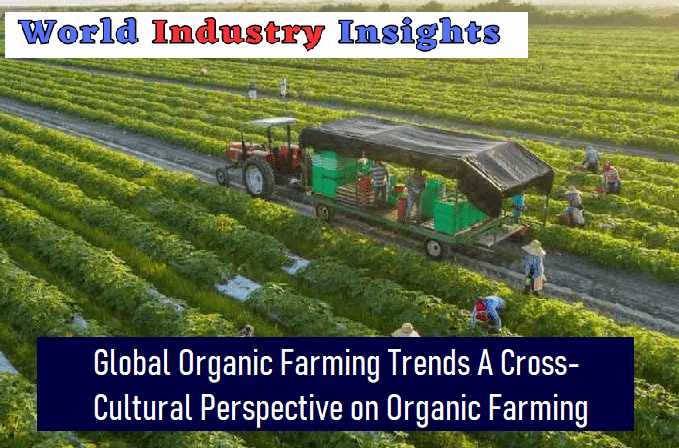Global Organic Farming : Organic farming an age-old method of agriculture pivoting on the use of natural fertilizers and pesticides, has surged to the forefront of modern agricultural discourse. This farming technique sidesteps the chemical-dependent conventional farming, giving precedence to a more sustainable, environmentally harmonious approach. With the global agricultural landscape tilting towards sustainability, organic farming has taken center stage in numerous nations, promising healthier produce and a greener earth.

Benefits of Organic Farming
Environmental benefits
Reduced chemical usage: Organic farming eschews synthetic pesticides and fertilizers, leading to significantly lower levels of environmental pollution.
Preservation of soil fertility: The use of organic manure bolsters soil fertility, ensuring its viability for future generations.
Conservation of biodiversity: By creating hospitable ecosystems, organic farming nurtures a diverse array of flora and fauna.
Health benefits
Lower pesticide residue in food: Consumers of organic produce ingest fewer toxins owing to the minimal use of harmful pesticides.
Enhanced nutritional value: Organic produce often boasts superior nutrient profiles, enriched with vitamins, minerals, and antioxidants.
Reduced risk of antibiotic resistance: Organic livestock farming negates the use of antibiotics, thereby mitigating the risk of antibiotic resistance in consumers.
Global Organic Farming Statistics
Organic farming growth trends worldwide
The last two decades have registered a remarkable uptick in global organic farming, propelled by environmental concerns and escalating demand for organic products.
Key countries leading in organic farming
Europe: European countries, led by Germany and France, have been trailblazers in organic farming, with a significant expanse of agricultural land under organic cultivation.
North America: Notably the United States and Canada, are experiencing robust growth in organic farming, driven by a burgeoning consumer demand for organic produce.
Australia: Australia houses the largest area of organic farmland globally, accounting for more than half of the worlds organic agricultural land.
Challenges faced by developing countries in adopting organic farming
Despite the burgeoning interest, developing countries grapple with obstacles such as lack of technological know-how, access to markets, and financial resources, hampering the widespread adoption of organic farming.
Organic Farming Practices Around the World
Organic farming practices, while varying across regions due to local ecological conditions, are tethered by common principles that emphasize sustainability, biodiversity, and ecological balance.
Organic certification standards
Countries have implemented rigorous organic certification standards, designed to ensure that organic products meet consistent, predefined criteria.
Crop rotation and intercropping techniques
Crop rotation and intercropping are seminal techniques in organic farming, bolstering soil fertility and curbing pest infestation.
Integrated pest management strategies
Organic farmers adopt an array of integrated pest management strategies that hinge on natural and biological controls, contributing to healthy ecosystems.
Composting and organic waste management
The use of compost and organic waste management strategies not only improves soil health but also assists in mitigating climate change by reducing waste and sequestering carbon.
Cultural Factors Influencing Organic Farming
Traditional farming practices and indigenous knowledge
In many cultures, traditional farming practices imbued with indigenous knowledge resonate with organic farming principles, highlighting the wisdom of ancestral agricultural practices.
Cultural attitudes towards nature and agriculture
In societies with deep reverence for nature, organic farming aligns seamlessly with cultural attitudes, promoting harmony between agriculture and the environment.
Importance of local and traditional food systems
Local food systems often prioritize organic farming, providing fresh, nutritious produce, and fortifying the link between the farm and the table.
Role of cultural identity in organic farming movements
Organic farming movements often tap into cultural identity, galvanizing communities around the shared ethos of healthful living and ecological stewardship.

Government Policies and Support for Organic Farming
Governmental support and policy frameworks play a pivotal role in catalyzing the transition towards organic farming.
Government initiatives promoting organic farming
Many governments have launched initiatives promoting organic farming, highlighting its importance in sustainable agricultural development and food security.
Subsidies and financial incentives for organic farmers
Subsidies and financial incentives have been instrumental in spurring farmers to switch to organic methods, making the transition economically viable.
Organic farming regulations and standards
Rigorous organic farming regulations and standards have been enacted worldwide to ensure product integrity, building consumer trust in organic products.
Market Trends and Consumer Demand
The global organic food market is on a robust growth trajectory, driven by a confluence of factors including heightened consumer awareness, health consciousness, and environmental concerns.
Growth of the organic food market
The organic food market is experiencing surging growth, fueled by a burgeoning consumer appetite for organic products.
Factors driving consumer demand for organic products
Rising health awareness, environmental concerns, and a shift towards ethical consumption practices are key factors driving the global demand for organic products.
Market challenges and opportunities for organic farmers
While organic farmers face challenges such as high production costs and rigorous certification processes, they stand to benefit from premium pricing and growing consumer demand.
Cross-Cultural Challenges and Solutions in Organic Farming
The international organic farming community, despite its diversity, grapples with shared challenges and opportunities.
Knowledge transfer and education
Cross-cultural exchanges of organic farming practices offer rich opportunities for learning and innovation, albeit faced with barriers such as language and differing farming traditions.
Adaptation of organic farming techniques to local conditions
Organic farming practices must be tailored to local conditions, underscoring the importance of context-specific solutions in enhancing agricultural productivity and sustainability.
Overcoming language and communication barriers
Language and communication barriers pose significant challenges to cross-cultural collaboration in organic farming, necessitating the development of inclusive, multi-lingual platforms.
Collaboration between organic farming communities worldwide
Collaboration fosters the exchange of ideas and best practices, strengthening the global organic farming community and fostering innovation.
Success Stories of Cross-Cultural Organic Farming
Successful organic farming initiatives worldwide provide valuable insights into the potential of cross-cultural collaboration in addressing shared agricultural challenges.
Case studies of successful organic farming initiatives in different countries
From India’s Zero Budget Natural Farming to Denmark’s Organic Action Plan, these initiatives illustrate the potential of organic farming in creating sustainable food systems.
Lessons learned and best practices for cross-cultural collaboration
These success stories offer critical lessons and best practices for fostering effective cross-cultural collaboration in the organic farming sector.
Future Outlook for Global Organic Farming
The future of global organic farming holds immense promise, driven by technological advancements, innovative practices, and a growing recognition of its role in addressing climate change.
Potential for further growth and expansion
With burgeoning consumer demand and increasing recognition of its environmental benefits, organic farming is poised for further growth and expansion worldwide.
Technological advancements in organic farming
Technological advancements are propelling organic farming into new frontiers, enhancing productivity and sustainability.
Sustainable and regenerative organic farming practices
The future of organic farming hinges on the adoption of sustainable and regenerative practices that restore soil health, enhance biodiversity, and mitigate climate change.
Role of organic farming in addressing climate change
As a low-carbon, resource-conserving agricultural practice, organic farming plays a critical role in mitigating climate change and fostering resilience.
Conclusion of Cross-Cultural Perspective on Organic Farming
Organic farming, with its cross-cultural resonance and multifaceted benefits, is poised to reshape the global agricultural landscape. It is an embodiment of an agricultural revolution that is gaining momentum, transforming food systems worldwide. Cultivating a cross-cultural perspective on organic farming is pivotal, as it fosters exchange, cooperation, and innovation. By championing organic farming, we not only safeguard our health and that of future generations but also steward the health of our planet.
FAQs Related to Cross-Cultural Perspective on Organic Farming
Q1. What is organic farming?
Organic farming is a method of agriculture that relies on natural processes and inputs, eschewing synthetic pesticides and fertilizers, and genetically modified organisms.
Q2. Why is organic farming beneficial?
Organic farming benefits the environment by reducing chemical usage and preserving biodiversity, while providing health benefits like lower pesticide residue in food and enhanced nutritional value.
Q3. What are the challenges for organic farming in developing countries?
Developing countries often face hurdles like lack of technical know-how, limited access to organic markets, and inadequate financial resources, hindering the transition to organic farming.
Q4. What role does government policy play in promoting organic farming?
Government policies can bolster organic farming through initiatives promoting organic practices, subsidies and financial incentives for organic farmers, and enforcing rigorous organic farming regulations and standards.
Q5. How is organic farming related to climate change?
Organic farming mitigates climate change by reducing greenhouse gas emissions, enhancing soil carbon sequestration, and promoting resilient agricultural systems in the face of climatic uncertainties.
Our Reader’s Queries
Which country has largest organic farming?
Australia has consistently been a leader in certified organic agriculture, boasting the highest number of certified organic hectares of any country since global statistics have been recorded. With an impressive 35 million certified organic hectares, Australia accounts for a whopping 54% of the world’s certified organic agricultural land. This equates to 8.8% of Australia’s total agricultural land, a significant contribution to the country’s organic farming industry.
Which top 3 nations expanding organic farming?
According to data from IFOAM-Organics International, the global increase in organic cultivation in 2020 was 3 million hectares. Argentina saw the largest increase, accounting for 7,81,000 hectares (up by 21%), followed by Uruguay at 5,89,000 hectares (28%) and India at 3,59,000 hectares (16%).
What percent of agriculture in the world is organic?
Despite the fact that only 1.6% of the world’s agricultural land is currently farmed organically, there are several countries that have a much higher percentage. In fact, 20 countries now have 10% or more of their agricultural land under organic management, which is an increase from 18 countries in 2020.
Do woofers get paid?
WWOOF is a unique opportunity for cultural and educational exchange. Hosts generously offer their property for WWOOFers to stay, and in return, WWOOFers lend a helping hand for 4-6 hours each day. This is a voluntary arrangement, with no payment involved. The focus is on learning and sharing experiences, making it a truly enriching experience for all involved.

